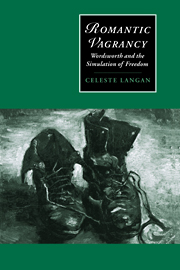Book contents
- Frontmatter
- Contents
- Acknowledgments
- List of abbreviations
- A methodological preamble
- Introduction
- 1 Rousseau plays the beggar: the last words of citizen subject
- 2 Money walks: Wordsworth and the right to wander
- 3 Walking and talking at the same time: the “two histories” of The Prelude
- 4 The walking cure
- Notes
- Works cited
- Index
- CAMBRIDGE STUDIES IN ROMANTICISM
2 - Money walks: Wordsworth and the right to wander
Published online by Cambridge University Press: 19 October 2009
- Frontmatter
- Contents
- Acknowledgments
- List of abbreviations
- A methodological preamble
- Introduction
- 1 Rousseau plays the beggar: the last words of citizen subject
- 2 Money walks: Wordsworth and the right to wander
- 3 Walking and talking at the same time: the “two histories” of The Prelude
- 4 The walking cure
- Notes
- Works cited
- Index
- CAMBRIDGE STUDIES IN ROMANTICISM
Summary
Wordsworth was once journeying to Lowther Castle to attend a dinner in his honour, at which the Lord Chief Justice and Mr. Justice Coleridge were to be present. They passed down Patterdale by Ullswater, then, leaving the chaise, they struck across some fields toward the castle. Suddenly the path ended in a blind wall. The poet muttered something and attacked the wall as if it were a living entity, crying out, “This is the way, an ancient right of way too,” and passed on. That evening after the ladies had left the room, Mr. Justice Coleridge said to Sir John Wallace who was a near resident: “Sir John, I fear we have committed trespass today; we came over a broken-down wall on your Estate.” Sir John seemed irate and said that could he have caught the man who broke it down, he would have horsewhipped him. The grave old bard at the end of the table heard the words, the fire flashed into his face and rising to his feet he answered: “ I broke your wall down, Sir John, it was obstructing an ancient right of way, and I will do it again. I am a Tory, but scratch me on the back deep enough and you will find the Whig in me yet.’
(Howard Hill, 40)In fact, ce n'est que le premier pas qui coûte.
(Marx, Capital 1.127)COUNTING (AND ACCOUNTING FOR) STEPS
My account of Wordsworth's manifesto of the Romantic project of literature, the second, two-volume edition of Lyrical Ballads (1800), is constructed as a meditation on Marx's insistence, in the first volume of Capital, that “in fact, ce n'est que le premier pas qui coûte” (“it is only the first step that costs”).
- Type
- Chapter
- Information
- Romantic VagrancyWordsworth and the Simulation of Freedom, pp. 59 - 138Publisher: Cambridge University PressPrint publication year: 1995



